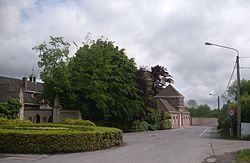
St. Sixtus' Abbey, Westvleteren (Dutch : Sint-Sixtusabdij Westvleteren), which belongs to the Cistercians of Strict Observance, or Trappists, is a Roman Catholic abbey located in Westvleteren, in the Belgian Province of West Flanders. The abbey is famous for its spiritual life, characterised by prayer, reading, and manual work, the three basic elements of Trappist life. It has also a reputation for its brewery, one of several producers of Trappist beer in Belgium.

